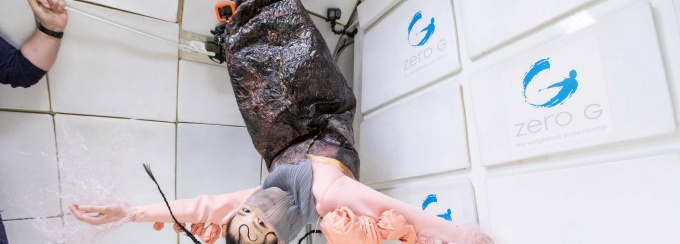
水土Water/Soil Discontent不服
Performance installation by artist Rae Yuping Hsu, presented in partnership with University at Buffalo’s Coalesce: Center for Biological Arts
Date: May 6th 7:00pm
Venue: Torn Space Theater – 612 Fillmore Ave. Buffalo, NY 14212
Cost: $10
Performance begins at 7pm followed by an artist talk with Rae Yuping Hsu
Get Tickets to 水土Water/Soil Discontent不服
Please join us for 水土Water/Soil Discontent不服, a night of peristaltic undulations in ceremony of gut decolonization. Offerings include a fermented dinner menu by Julian Stadon, stratified pastries by Ethan Kan, and a performance by Hsurae, all taking place at Torn Space Theater, 612 Fillmore Ave. Buffalo, NY 14212 for one night only, Friday May 6 starting at 7:00pm.
PROJECT DESCRIPTION
水土Water/Soil Discontent不服 is a performative installation offering multimodal readings on the microbiopolitics of the movement of bodies across lands. The title of the performance takes the phenomenon of 水土不服 (water soil discontent) as a site of reinspection. 水土不服is an umbrella term in Chinese medicine and households for a myriad of ailments encountered when traveling to a foreign land. Taking recent scientific studies on gut microbiome colonization among immigrants as a starting point, the project journeys backwards to interweave narratives and materials from Traditional Chinese Medicine and household remedies as an attempt to cut across coloniality, both in the gut and in systems of knowledge. Human and nonhuman fecal matter figures into the work as material in both eastern and western medicine, but also as an anti-aesthetic, a spatial operator delimiting the illusory boundaries of a contained self.
BIO
Rae Yuping Hsu (they/it) is an artist and educator from Taipei, Taiwan, currently based in New York. Their material-discursive practice spans a wide spectrum; from hot glass to fibroblasts, passports to fecal sports. Their recent works speculate on microbial ethics within interplanetary travel, reconstructed against narratives of colonization. They work interstitially, collaborating often with other artists, researchers and scientists. They hold a Masters of Science in Art, Culture, and Technology from MIT, and currently teaches at The New School, NYU and SVA.
Their works have been shown in the Taipei Fine Art Museum, Kaoshiung Art Museum, National Taiwan Museum of Fine Arts, Dubai BAIT15, Taipei Digital Art festival, Medialab Prado, Sakiya Ramallah, ARTTaipei, Yiri Art Gallery, Waley Arts Gallery, Grand Siecle gallery, Boston ICA, Olfactory Art Keller. Recent residencies include SymbioticA, hangar.org, MedialabPrado, _V2 institute for the unstable media, Coalesce, and Urbanglass.
Julian Stadon is an Australian artist, designer, curator, researcher and educator lecturing on the Interface Cultures Programme at Kunstuniversität Linz. Julian has a transdisciplinary approach to teaching and research, across several fields that intersect Art, Interaction/Interface Design, Game Studies, Next Generation Interfaces, Creative Coding, Physical Computing, Mixed Reality and Immersion, Innovative Media, Fashion Technology, Sustainability, Agriculture, Biotechnology, Food Science, Culinary Aesthetics, Image Culture, Post-Digital Aesthetics and Media Theory, all within the context of Augmentation Aesthetics and Post-Anthropocenic Design. https://teleagriculture.org/
Ethan Kan is a pastry chef who has worked at Shangri-La Paris, Sweet Rehab and Chanson Patisserie in New York. He has a Bachelor in Science from National Taiwan University, and a certificate from the intensive professional program at École Ferrandi, Paris.
ARTIST STATEMENT from Rae Yuping Hsu
In my practice as artist and educator, I’m committed to foraging and composting moments that point to a primordial intrusion of alterity, an intrusion that would be crucial to the onto-epistemological formulation of “self.” My intra-disciplinary research is often chaotic, with major nodes within synthetic biology, material studies, black studies, crip studies, posthumanities and communities of fermentation. These inquiries inform a sort of endosymbiotic aesthetics, the meaning of which I am still tending to.
I have formal training in the fields of science and technology, and an undercurrent of my work contends with the conditions and histories that these fields of study are laid upon. My works often undermine positivism via a combination of abjection and seduction, inviting the body of reception to an affective relationship rather than an alienating one. The doctrine of humanity, which is often made into a project of exclusion via the tools of science and technology, is deconstructed through multimodal and nonhuman perspectives. My inquiries probe at possibilities to think of contaminants beyond the metaphor of invasion, towards an invitation.
Coalesce: Center for Biological Arts is a hybrid studio laboratory facility dedicated to enabling hands-on creative engagement with the tools and technologies from the life sciences.
Coalesce Connects Disciplines
Coalesce is a center where artists, designers, and architects actively learn, use and create. With the shared medium of life sciences technologies, scientists explore new forms or broader cultural meanings of their work, and philosophers, writers and social scientists interact in a tangible way with the processes of life sciences. Coalesce encourages researchers and artists to challenge disciplinary labels and incubate hybrid creative practices.
Coalesce Responds to the Grand Challenge
From medicine to the environment, from stem cells to microbes, from genes to biomes, much of the US public is ill prepared to evaluate the most complex questions, challenges, and issues facing our society today. “What does it mean to design a living organism?” “What aspects of such an organism could be called an invention… or an artwork?” “How do we presently define life?” Coalesce complements UB’s expertise in the life sciences by addressing questions and issues vital to public understanding and participation, beyond the analytical constraints of most disciplines.